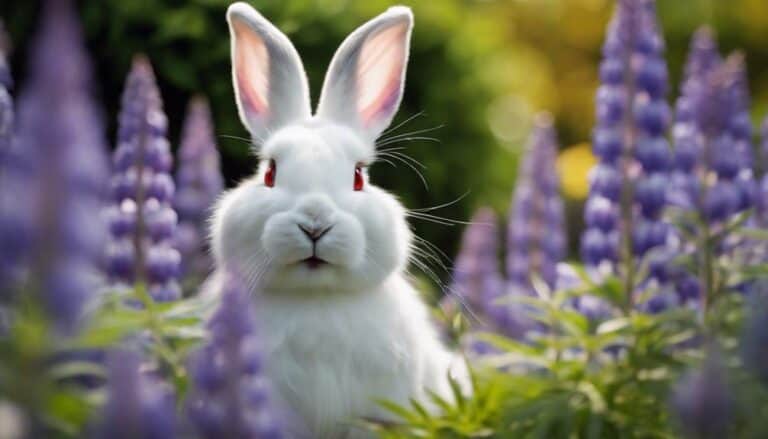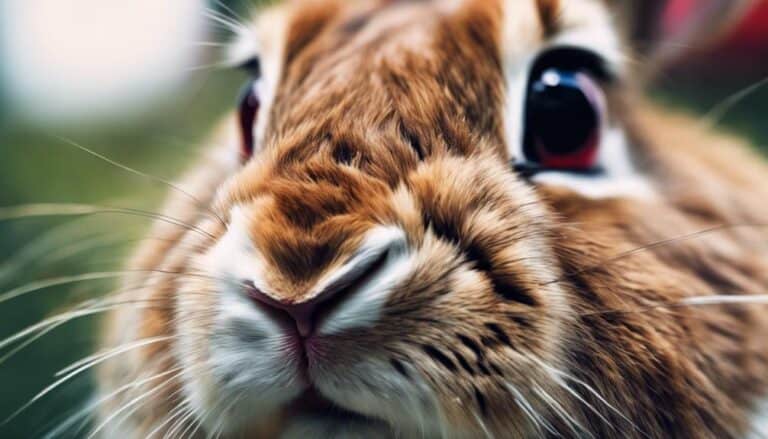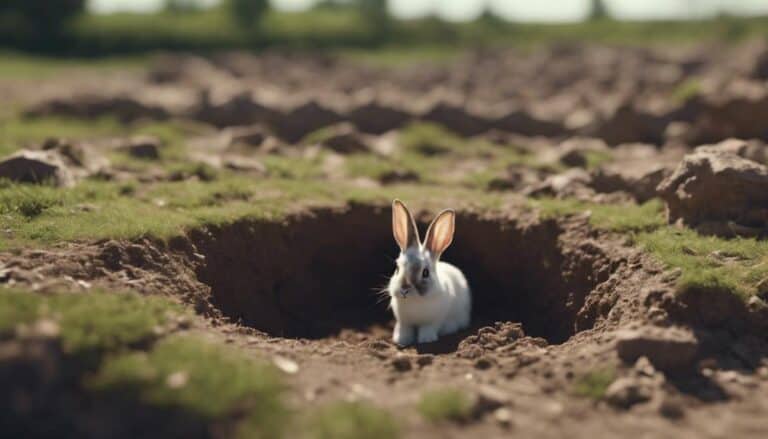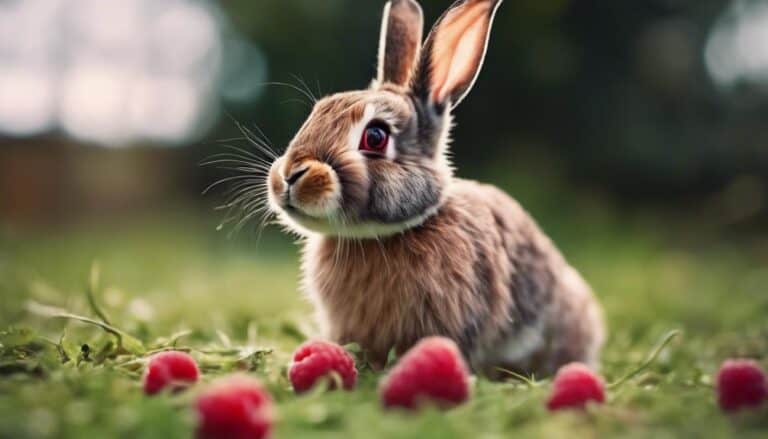Like a curious explorer in a vast forest, you may wonder if wild bunnies have a penchant for carrots.
While the image of bunnies munching on carrots is iconic, the reality might surprise you.
So, do wild bunnies truly have a carrot craze, or is there more to this crunchy tale?
Contents
- 1 Key Takeaways
- 2 Wild Bunny Dietary Habits
- 3 Carrots in Wild Bunnies' Diet
- 4 Nutritional Value of Carrots for Bunnies
- 5 Feeding Wild Bunnies Carrots
- 6 Wild Bunnies' Natural Food Choices
- 7 Carrots in Pet Rabbit Diet
- 8 Is Lettuce Safe for Wild Bunnies to Eat Like Carrots?
- 9 Frequently Asked Questions
- 10 Conclusion
Key Takeaways
- Wild bunnies prioritize dark leafy greens and grasses over carrots.
- Carrots serve as a supplement, not a primary food source for wild bunnies.
- Carrots offer essential vitamins, fiber, and minerals beneficial for bunny health.
- Moderation in feeding carrots ensures nutritional balance and prevents overreliance.
Wild Bunny Dietary Habits
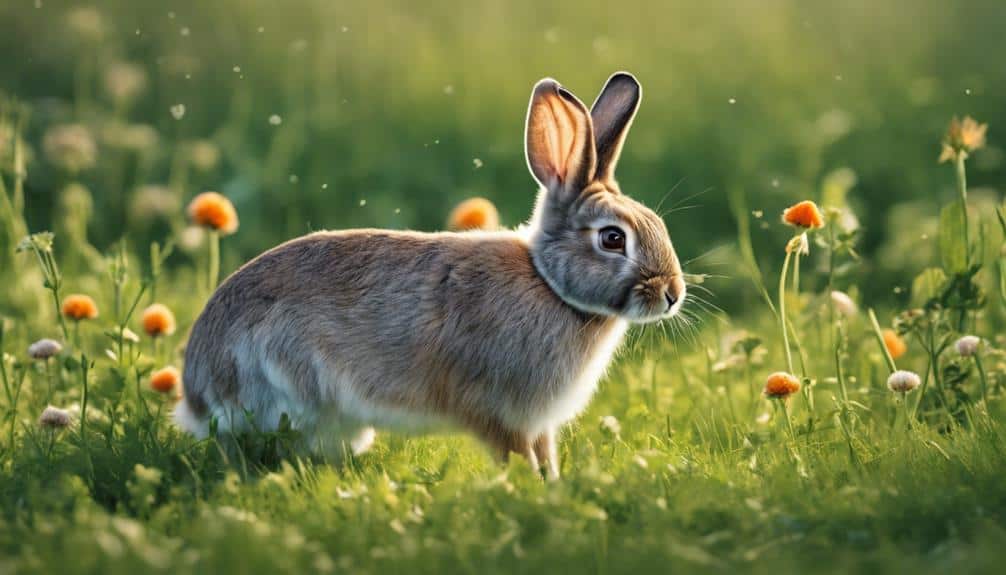
Wild bunnies primarily opt for dark leafy greens, grasses, and herbs as their main dietary choices in the wild. These wild rabbits have a natural inclination towards fresh foliage, which provides essential nutrients and hydration. Leafy greens such as dandelion greens, clover, and plantain are commonly sought after by wild bunnies due to their high fiber content and nutritional value. Grass, another staple in their diet, offers roughage necessary for proper digestion and dental health in these small herbivores.
Observing wild rabbits in their natural habitat, you can see them nibbling on a variety of greenery to meet their dietary needs. Their preference for leafy greens and grass highlights their instinctual selection of foods that aid in their overall well-being. By prioritizing these natural food sources, wild bunnies maintain a balanced diet that supports their growth and survival in the wild. Understanding their dietary habits can help in providing suitable options for attracting or caring for these delightful creatures.
Carrots in Wild Bunnies' Diet
Wild bunnies may occasionally nibble on carrots in the wild, especially when their usual leafy greens are scarce. Carrots serve as a dietary supplement rather than a primary food source for wild bunnies, impacting their health by providing additional nutrients.
It's important to note that wild bunnies prioritize foliage over carrots, opting for quick and easy snacks when available.
Wild Bunnies' Carrot Consumption
In the natural habitat, bunnies may include carrots in their diet when leafy greens are scarce. Wild rabbits, while not necessarily seeking out carrots as their first choice, may turn to them when other quick and easy snack options are unavailable.
That in the wild, dark, leafy greens are generally preferred over carrots by most rabbits. When no other options are present, wild bunnies may consume carrots, although they aren't the top choice for feeding these animals.
Opting for a diet rich in a variety of vegetables more suited to their natural preferences is ideal for supporting the health and well-being of wild rabbits in their environment.
Carrots as Dietary Supplement
When supplementing wild bunnies' diet, incorporating carrots can provide essential nutrients like vitamin A, B, K, fiber, and minerals. Wild rabbits benefit from the additional nutrients carrots offer, aiding in maintaining a balanced diet.
Here are some observations about using carrots as a dietary supplement for wild bunnies:
- Carrots are a good source of Vitamin A, important for vision and immune function.
- They contain fiber, promoting digestive health in wild rabbits.
- Carrots offer essential minerals like potassium and manganese, supporting overall well-being.
- Moderation is key when feeding carrots to wild bunnies to prevent overreliance and encourage a varied, natural diet.
Impact on Bunny Health
Observing the impact of incorporating carrots into a wild bunny's diet reveals significant nutritional benefits for their overall health. Wild rabbits can eat carrots as a treat, providing essential vitamins and minerals that support heart health, lung function, vision, and the immune system.
While essential is important to prevent weight gain, carrots serve as a valuable snack for wild bunnies, especially when their usual food sources are limited. Offering carrots to wild rabbits can supplement their diet during times when dark greens are scarce, ensuring they receive necessary nutrients.
Nutritional Value of Carrots for Bunnies
The nutritional value of carrots for bunnies lies in their richness in essential vitamins, fiber, and minerals. When considering the benefits of carrots in a bunny's diet, it's important to understand the following:
- Vitamins Galore: Carrots are packed with essential vitamins such as A, B, and K, which play important roles in maintaining your bunny's overall health.
- Fiber Boost: The fiber content in carrots aids in digestion and helps keep your bunny's gastrointestinal tract healthy and functioning at its best.
- Mineral Rich: Carrots also provide important minerals that contribute to your bunny's well-being, supporting various bodily functions.
- Moderation Matters: While carrots offer valuable health benefits, their sugar content means they should be given in moderation to prevent potential weight issues.
Incorporating carrots into your bunny's diet can be a great way to add variety and nutrition, but remember, balance is key to ensuring your furry friend stays healthy and happy.
Feeding Wild Bunnies Carrots
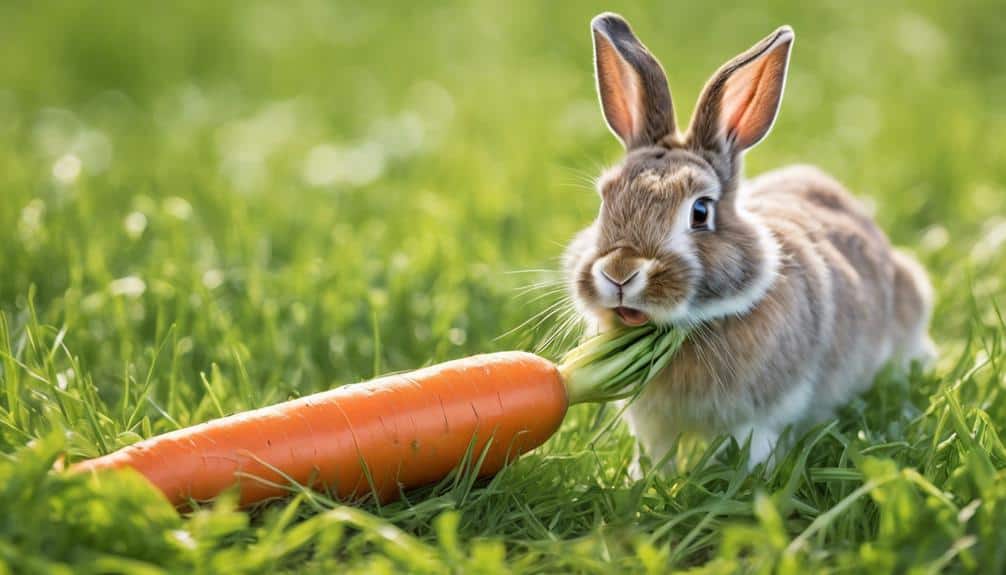
Feeding wild bunnies carrots can be a tempting idea, but it's crucial to contemplate their health implications.
While bunnies may nibble on carrots, they aren't a primary source of nutrition for these animals.
Opting for dark, leafy greens over carrots guarantees a balanced diet for wild bunnies and prevents potential issues like overfeeding.
Carrots and Wild Bunnies
In the natural habitat of wild bunnies, carrots serve as a supplementary food source when leafy greens are scarce. Here are some observations about wild bunnies and carrots:
- Wild bunnies may eat carrots when leafy greens aren't readily available in their environment.
- Carrots aren't the top choice for wild bunnies, as they prefer foliage over root vegetables.
- Feeding wild bunnies carrots could potentially attract more of them to your surroundings.
- Dark, leafy greens are generally preferred over carrots by most wild bunnies due to their natural diet preferences.
Health Benefits for Bunnies
Observing wild bunnies enjoying the occasional carrot as a nutritious supplement reveals their potential health benefits in supporting digestive health and providing essential vitamins and minerals.
Carrots are rich in vitamins A, B, and K, offering important nutrients for wild bunnies. The fiber content in carrots aids in maintaining their digestive health and overall well-being. Additionally, carrots provide essential minerals important for the growth and proper functioning of wild bunnies' immune systems.
It's important to offer carrots to wild bunnies in moderation to prevent issues like weight gain. While carrots can be a nutritious treat for these creatures, they shouldn't serve as their primary food source. By incorporating carrots into their diet wisely, you can help support the health of wild bunnies in your area.
Wild Bunnies' Natural Food Choices
During their foraging activities, wild bunnies naturally gravitate towards dark leafy greens and grasses as their preferred food choices. Here are some observations about wild bunnies' natural food choices:
- Leafy Greens: Wild rabbits thrive on a diet rich in dark leafy greens like kale, dandelion greens, and spinach. These greens provide essential nutrients and fiber necessary for their well-being.
- Grasses: Grasses such as timothy hay and clover are staples in the diet of wild bunnies. They aid in digestion and help wear down the rabbit's teeth, which continuously grow.
- Herbs: Wild bunnies enjoy nibbling on various herbs like parsley, cilantro, and basil. These herbs not only add flavor but also offer additional health benefits.
- Vegetables: While wild bunnies may occasionally consume carrots, their primary focus remains on leafy greens and grasses. Carrots serve as a secondary option when their preferred food sources are limited.
Understanding the natural food choices of wild bunnies can help in providing suitable nutrition for pet rabbits as well.
Carrots in Pet Rabbit Diet
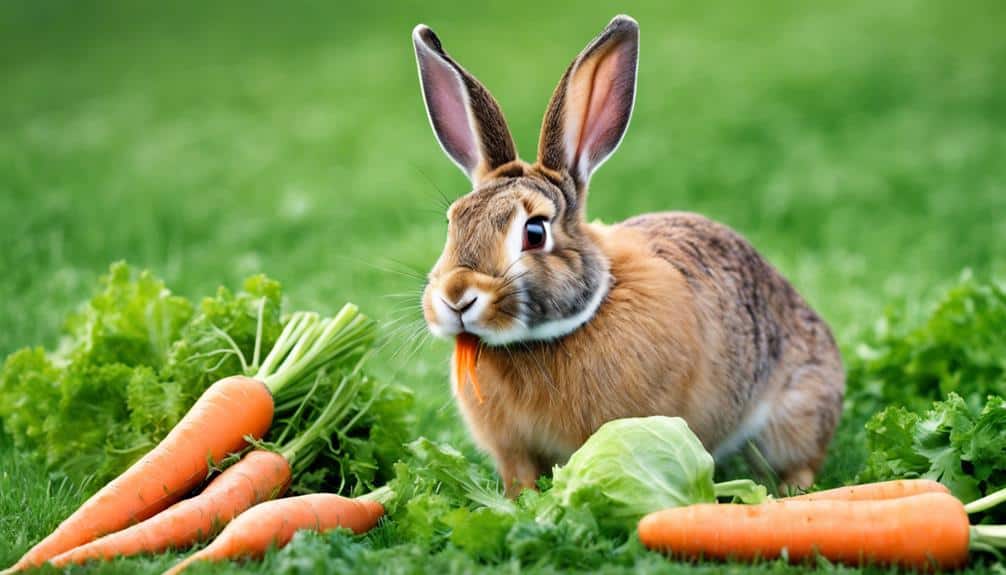
When considering the dietary inclusion of carrots for pet rabbits, it's essential to offer this nutritious vegetable in moderation due to its sugar content. Carrots can indeed be a tasty and healthy treat for your pet rabbit, but too much can lead to an imbalance in their diet.
While pet rabbits enjoy carrots more than their wild counterparts do, it's important to remember that moderation is key. Carrots offer good health benefits for pet rabbits when included in their diet, providing essential nutrients and fiber. By feeding carrots in moderation, you can make sure that your pet rabbit maintains a balanced diet that promotes their overall well-being.
Is Lettuce Safe for Wild Bunnies to Eat Like Carrots?
Yes, bunnies eating lettuce regularly is safe for them. Lettuce can be a part of a wild bunny’s diet, just like carrots. However, it should be given in moderation to prevent digestive issues. It’s best to introduce new foods slowly and observe any changes in behavior or health.
Frequently Asked Questions
Can I Leave Carrots Out for Wild Rabbits?
You can leave carrots out for wild rabbits, but dark greens are better. Carrots, while acceptable, aren't their top choice. Offering a variety of foods attracts wildlife, ensuring a balanced diet for these creatures.
What Do You Feed Wild Rabbits in Your Yard?
In your yard, offer a mix of natural foraging options, such as seed mixtures and various hay varieties, to support wild rabbits' health. Providing diverse food sources mimics their natural diet and guarantees a balanced nutrition plan.
What Vegetables Do Wild Rabbits Not Eat?
You should be aware of certain vegetables wild rabbits avoid due to their dietary restrictions. Poisonous plants are a big no. Their foraging habits steer them clear of some vegetables, respecting their natural instincts.
What Do Wild Rabbits Eat at Night?
At night, wild rabbits exhibit nocturnal foraging behavior. Their diet consists of grass, hay, leafy plants, dark greens, twigs, and bark. After dark, they graze on natural vegetation to meet their nutritional needs.
Conclusion
In the wild, bunnies may nibble on carrots when other food options are scarce, but their preference lies in dark greens and foliage. Carrots, while rich in vitamins and minerals, should be given in moderation to prevent weight issues due to their high sugar content.
Just like a foraging rabbit chooses its food carefully, offering carrots as a treat rather than a staple in their diet is key to keeping them healthy and happy.

